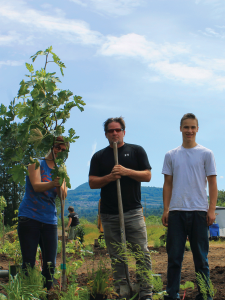By Katherine Gibson (The Cascade)

Things are looking up for Abbotsford’s homeless population.
Building on the momentum gained by the Abbotsford Dignitarian Society’s proposal for a “Dignity Village” just off of the Abbotsford-Mission Highway, volunteers began planting an edible garden on the proposed piece of land.
Volunteers ranging from Valley Permaculture Guild and members of the Abbotsford Atheists, Skeptics and Humanists to homeless individuals themselves spent the better portion of June 22 working together to plant and begin cultivating the site.
The edible garden, which gained $4,000 in funding through a Valley Permaculture Guild grant proposal, will give homeless individuals living on the site the opportunity to create a sustainable food source for themselves and those around them.

“Self-sufficiency is a big deal,” notes Valley Permaculture Guild member Banning Symington. “To actually be involved with their own self sufficiency and food security, they’re going to be involved with feeding themselves.”
Rachel Symington, his wife and the co-founder of the Valley Permaculture Guild, shares this sentiment, further noting that the garden will also help create a “sustainable community” for those living on the site.
“We’ve consulted a lot of the [homeless individuals] who will be living here … and one of the things that they want is to be a sustainable community,” she notes. “It isn’t just about feeding people; it’s about teaching people how to feed themselves too.”
Rachel also notes that planting an edible garden will give individuals access to fresh fruits and vegetables that are often missing from other food sources, such as the food bank.
“One of the problems that I run into at food banks is that they always want root crops because those always last the longest, which is great, but what about the fresh lettuces, and strawberries, and cherries?” she goes on. “The root crops are really good, but you need something more diverse than that.”
Beyond simply satisfying the nutritional needs of the homeless, both Banning and Rachel note that the garden can potentially have a long-lasting holistic effect, positively impacting mental health just as much as the physical.
“For people living on the streets, the stats are pretty clear that often it is because of mental health and addiction issues, so it’s not about just giving [homeless individuals] a place to live and that’s it; we’re creating support networks,” says Banning. “The food satisfies the feeding of people, but it also becomes a medium for learning, communication, and interactions with others.”
And while the edible garden will only be a two-acre portion of the proposed site, Banning maintains that the garden’s ability to satisfy the needs of those living on the property will give homeless individuals and the community strength.

“This is a situation of empowering people who have been the least empowered people in our society. This is the area that needs the most focus in our society and food security,” Banning goes on. “You need to satisfy the fundamentals and then you can start working on gaining ‘dignity.’”
The edible garden functions much like a forest in that the nutrients from the various plants work in collaboration with each other, sustaining themselves rather than relying on chemicals or outside fertilizers.
Interestingly, this will be the first edible garden of its kind in Abbotsford, a fact that Rachel believes makes this project an opportunity for growth not only for the homeless but the entire permaculture community as well.
“To my knowledge, this is the first food forest of its kind happening in Abbotsford that deals with more of a polyculture. You have trees and shrubs and the nutrients from one plant help with the nutrients for another plant, so you don’t have to be adding fertilizer,” she says. “This is something that the Valley Permaculture Society has an incentive to stay involved in because we want to use this as a learning opportunity … if we can do it here, we can do it elsewhere.”
Currently, the City of Abbotsford has not given the project any official zoning permits to begin construction on the proposed housing units themselves. However, the land is already zoned as agricultural, which makes planting the edible garden completely within the City’s laws.
As volunteer and Abbotsford Atheists, Skeptics, and Humanists member Jeff Gruban notes, planting the garden marks an important step towards creating a feasible solution for Abbotsford’s homeless population.
“It’s our step towards a solution for the homeless. It’s a step towards it. It means that this project is going forward,” notes Gruban. “There’s still some work that we have to do with the City, and we are doing that. We don’t want anybody to think that we’re pushing ahead without the City’s approval. This [land] is actually zoned ‘agricultural’ and we’re planting, so we’re not breaking any city laws.”
While Gruban recognizes that the Abbotsford homeless situation is complicated, he maintains that continuing work on projects like the proposed “Dignity Village” will ultimately benefit the city.
“All these problems that we’re trying to tackle are very complicated and no one solution will solve it, but this is one solution that’s been tried in many other cities in the United States for years and years — it’s a proven model,” Gruban concludes. “You can say the ‘homeless problem’ is a problem for the homeless, but the way we look at it, the people in Abbotsford who are homeless are our residents; they’re our neighbours, so it’s an ‘Abbotsford problem’ … This is a positive solution and we’re all excited about it.”


